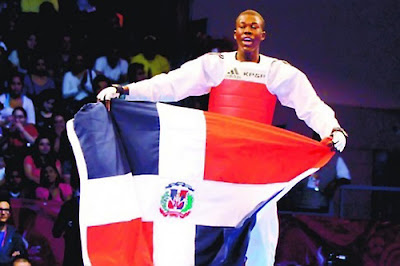The Dominican Republic's only medal at the Olympics in Rio this past summer forced many Dominicans to ask themselves what it meant to be Dominican, what it takes to be: "one of us."
 |
| Dominican nationalists suspects match was fixed. Acento |
Hector Arias, better known as "El Taliban," took up the question of whether Luisito Pié was Dominican, using harsh language and causing a scandal that many thought would see him removed from television like El Cocodrilo, who in a similar explosion of ultra-nationalist rage insulted the US Ambassador and was later censored by the government.
El Taliban, using a long list of expletives, argued that Luisito was not Dominican because his biological father -- who left the picture when he was young -- and his mother are both Haitian-born and of full Haitian descent.
El Taliban argued that Luisito's mother could not speak Dominican Spanish, that it was heavily accented. In line with the immigration laws of countries in Europe, Ms. Pié could be deported should she divorce Luisito's Dominican stepfather, since she likely couldn't pass an assimilation/language test.
Due to the fact that Luisito's Dominican stepfather wrote him into the civil registry, his right to live in the Dominican Republic has never been in question, and it did not come under scrutiny after the Constitutional Tribunal's 2013 decision to ascertain that birthright citizenship was not the law of the land.
Nonetheless, Luisito still retains Haitian citizenship due to both of his biological parents being full-blown Haitian nationals, thus making him a dual-citizen.
Haiti occupied the Dominican Republic for 22 years and later, through a series of military invasions, attempted to re-occupy the country. Today, the island of Hispaniola is on the verge of an ecological catastrophe, and many experts argue that a resource war is in its early stages.
In the same way that the 2010 earthquake which leveled Port-Au-Prince led to an avalanche of Haitians making their way to Dominican soil, so will the current famine and political instability lead to another influx of desperate migrants seeking better pastures in their already-struggling neighbor.
The Dominican Republic, to ensure its survival in the face of a numerically-superior historical adversary must past strict laws regulating dual citizenship, laws similar to those found in the Netherlands, who finds itself surrounded by: Germany, France, the UK, and Belgium, countries with a history and a culture conducive to empire-building, much like Haiti.
It was Haitian Emperor Faustin I who commanded, as one of his first orders of business, an invasion of a nascent Dominican Republic in order to re-occupy it; burning, looting, and plotting to commit a full-blown genocide of the Dominican people, so that the entire island would be forever Haitian.
Although it may sound unlikely, another Haitian empire could rise out of the ashes of the current unpredictability which has rendered the country a failed state, and the dozens of thousands of dual-nationals in the Dominican Republic will be seen as a Fifth column, making it difficult to tell friend from foe.
An overpopulated island smaller than South Carolina housing two countries, one of them with a history of empire, cannot simply grant citizenship to anyone who walks in, and any Haitian citizens who are given the privilege of enjoying Dominican citizenship should know that it could be taken away from them should they be convicted of a crime, even if they're Olympic superstars; no one should be above the law.
Until the time that Luisito comes under police suspicion of a having committed a felony, his citizenship shouldn't be in question, and he should be given all the privileges afforded by it.
